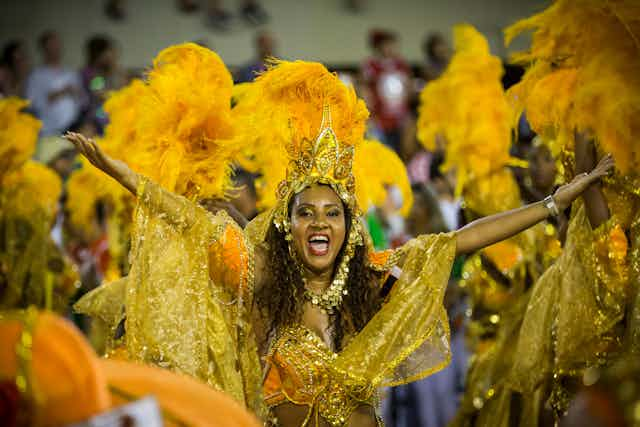After five days of revelry, involving more than a million visitors and participants, Rio’s Carnival has drawn to a close. It is, in some ways, a global phenomenon: Carnival captures a sense of the exotic, creative flair of South American culture, and projects it outward to an enormous audience from around the world. Even the name of the city conjures up images of flamboyant dancers, head dresses and colourful floats. This collection of vibrant and awe-inspiring human art installations seems, at some level, to embody Brazilian culture.
Carnivals take place in many locations throughout the world, and most have their origins in cultural and religious traditions and rituals. Indeed, the word “carnival” comes from the Latin phrase “carne-vale” (flesh farewell) originally marking a period of feasting and revelry before the fasting of Lent. But can carnivals – in particular Rio’s Carnival – really be seen in this light anymore? Or have they been passed over to the forces of globalisation and commodification, and become a mere spectacle staged for the consumption of tourists?
After all, Rio’s Carnival now generates in the region of 3.2 billion Brazilian Real (£570m), and three quarters of this comes from tourism alone. The 200 samba schools that take part in the parades spend up to £3m on outfits and preparations, and 250,000 jobs are created each year by the carnival.
Double the fun?
Despite the recent downturn, Carnival’s annual economic benefits for the city have been likened to that of an Olympic Games – which might lead one to expect that the city will benefit doubly this year, as it prepares to host the games in August.
Sporting mega events are proven, with effective management, to secure high return on investment; a good example being the 1992 summer Olympics in Barcelona. But such returns are never guaranteed. For one thing, public funding is sacrificed to host mega-events; increased taxes and spending cuts to other areas often are not taken into account when calculating the financial benefits. And whereas a vast proportion of money invested comes from the public purse, much of the profit received does not go back to the public, but to shareholders and investors.

Social benefits are also achievable, through sound ethical investments in education, transportation and security, as per London 2012’s legacy policy. But all too often, these provisions are short-term and heavy-handed, with little or no consideration for the needs of communities that live in the city.
Stark contrast
One example can be seen in the favelas, which have become a major part of Brazilian culture. Favelas are informal urban settlements, which typically house a city’s poorest residents. And while the favelas are often associated with social and health issues such as crime, drug use and teenage pregnancy, they are also people’s homes. Many of Rio’s samba schools – which prepare the floats for Carnival’s parades – are based in these areas: the celebrations are woven into their economic and cultural fabric.
Part of the programme to prepare for the Olympics is to “clean up” or “pacify” the favelas, to make the city safe for tourists. With a greater police presence, forced evictions and questionable pacification tactics, this policy has the potential to stifle creativity and freedom of expression, while quashing the counterculture which gives Rio its unique character.
And so, Carnival offers more to the local people than any mega event ever could through a sense of ownership and shared value. In essence, the playful cultural activities that it involves reflects their culture, provides freedom of expression and bolsters the creative industries. Carnival is Rio: it has been part of the city’s cultural life since the 1700s. And while hosting the Olympic Games gives Brazil the opportunity to stage two of the biggest shows on Earth in one year, Carnival is much more important to its cultural and spiritual survival.

